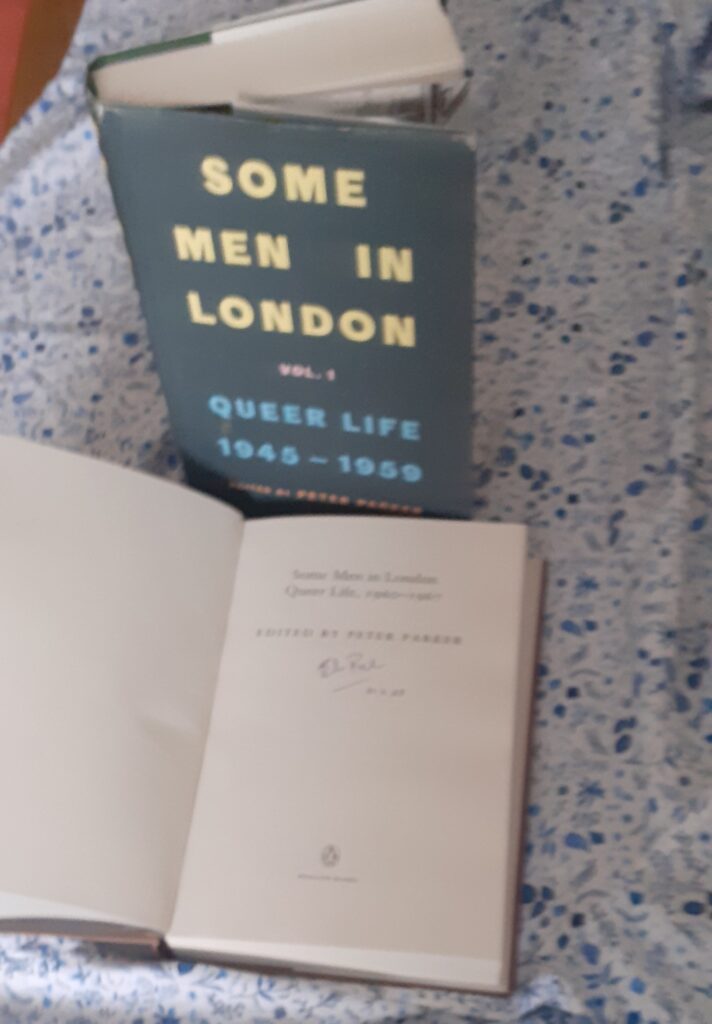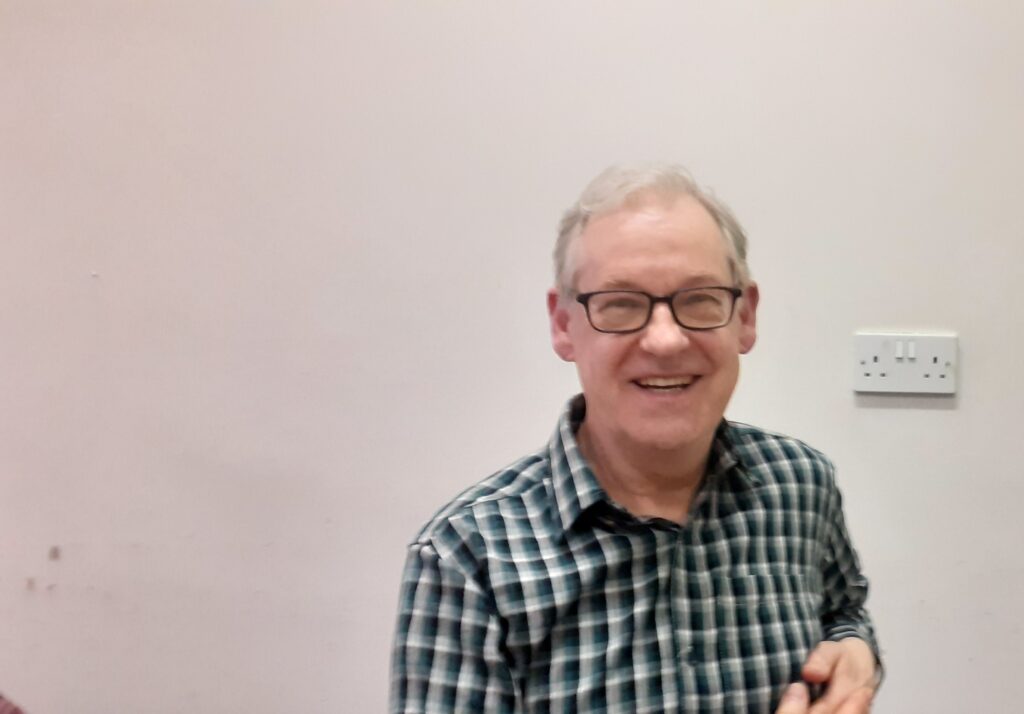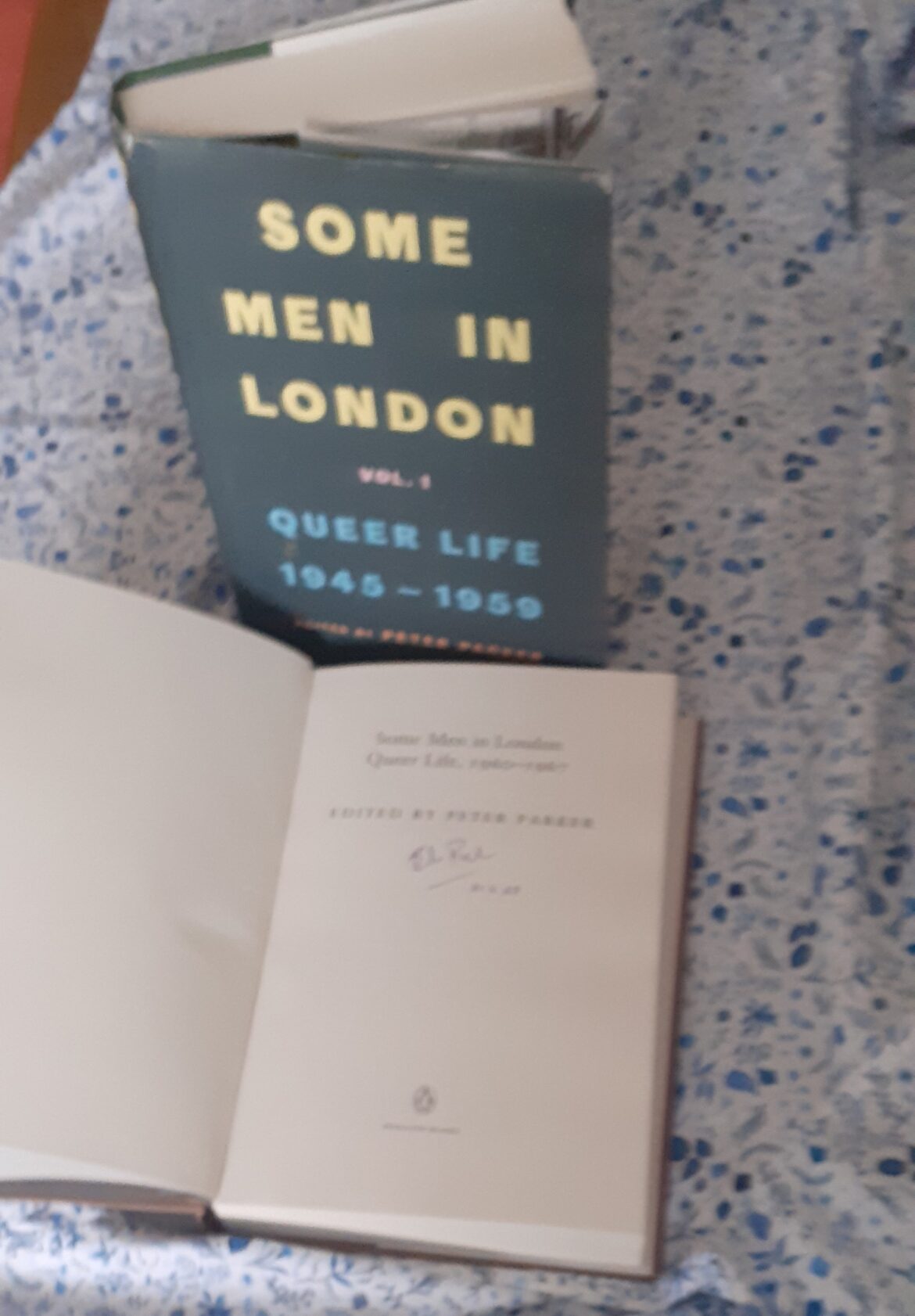
On VE Day, May 8th 1945, my aunt Floss and her cousin Grace were dancing along with thousands of others in Trafalgar Square. The Nazis were beaten, and freedom had been preserved. Elsewhere another cousin, let us call him Reg, was also celebrating, but there was a tinge of sadness and shame to his reverie as he was unable to celebrate with the man he loved. That could have landed him in prison.
The partial decriminalisation of homosexuality in 1967 following on from the Wolfenden Report in 1957 only partially solved the problems that men like Reg had.
This drew me to books by Peter Parker entitled ‘Some Men in London’. The two volumes chart and record the immediate post war period from VE day to the passing of the Sexual Offences Act of 1967. Immediately, I ordered both looking forward to reading them with relish. At the same time, I booked myself onto a talk by the editor, compiler and curator of the books, Peter Parker at Shoe Lane library, just off Fleet Street.

The books have been extensively researched, they contain excerpts from plays, court statements, parliamentary accounts, books, films, newspapers and any other media available at that time.
There are accounts of ordinary men, dustmen, soldiers, office workers, civil servants, and actors as well as the great and the good in the Houses of Lords and Commons, members of the aristocracy also get mentioned. None are judged other than by the courts of the era, and not by the editor for their actions, many are arrested for importuning other men for sex.
Some are clearly prostitutes, others simply in search of sexual satisfaction, still some others in the wrong time and place. All are wary of being arrested, of having their names read out in court to then be reported in a very unsympathetic press.
Each snippet or information builds toward the writing and publishing of the Wolfenden report in 1957, a watershed moment, where outright condemnation of homosexuality began to fade into at least a form of sympathy from many people, articles in the press, letters to the editor in the Times or the Telegraph are published here in both volumes showing how public opinion slowly changed and indeed ended out of step with their representatives in both Houses of Parliament.
Indeed, the book shows how it took pressure from many quarters, including a small but growing element of brave souls who were to publicly state their homosexuality and call for change with the formation of the Homosexual Law Reform Society in 1958. The group, who included the publisher Victor Gollancz, poet Stephen Spender, and the Labour MP Kenneth Younger campaigned for a parliamentary debate. Following which they demanded the implementation of the recommendations of the Wolfenden Report published the previous year.
The first volume ends with the bizarre story of a young man being taken to court for offenses against girls, having previously being thought of as homosexual. This led to a psychologist making the bizarre claim that, ‘these offences are at least evidence of a step in the right direction’. This shows how homosexuality was perceived even by the medical profession, much still needed to change at this point where the sexual assault of a woman was seen as better than consensual sex between two men.
The second volume, continuing in the same vein as the first begins where the previous volume left off. It charts the changes in view of public opinion and of increasing pressure from a growing lobby of homosexual men that change must be made. It ends with the passing of the 1967 Sexual Offences Act. Allowing sex between two consenting men behind locked doors to take place so long as there is no other person or persons present. If anyone were to complain at what had been seen, or report that this law had been broken, arrests would and did follow, right up to and including changes in the law that were passed in the early 2000’s. It is for this reason it is said that there was only partial decriminalisation for the best part of 40 years.
I had the pleasure recently of interviewing Peter Parker, and he confirms that immediately after the passing of the 1967 act arrests of gay, queer or homosexual men increased for ‘importuning’, ‘gross indecency’ and other acts that could be said to have taken place in public.
A bloke chatting up a bloke at a bus stop could still get you arrested in the 1970s and 80s. Chatting up a woman, a slap from her is she was unimpressed was the worst you could expect, unless her boyfriend was nearby.
At the end of the second volume a letter in August 1967 from Sir Joseph Simpson the then Metropolitan Police Commissioner to the Permanent Under-Secretary at the Home Office, Sir Phillip Allen, outlined why the Commissioner felt it was appropriate to re-introduce ‘plain-clothes’ policemen to deal with the ‘problem’ of homosexuals in public places.
These were the so-called ‘pretty-boy’ policemen the Met would spend the next forty years denying they used, despite evidence to the contrary. They accounted for the numbers of arrests shooting up immediately after legalisation.
For me these books are informative, a good account of the history of the time they cover and are highly engaging. I can see where they create a useful resource for those with interests in social and political history. They tell us a lot about how ordinary gay men lived and sometimes thrived in what were very difficult times. At times some of the stories are amusing, the catty comments about various actors and their ‘conquests’ are in themselves great anecdotes.
It should be noted that without the Homosexual Law Reform Society and their initial campaigns of letter writing to the press and the to the ‘great and good’ of British society it would have been difficult for the Campaign for Homosexual Equality, the Gay Liberation Front and the politically motivated Gay Pride marches of the 70s and 80s to have happened, and for me to have joined them.
This then reflects on the modern era with some still alive and able to remember the issues around being a gay man before 1967, someone born in 1947 would have been 20 in 1967, and is now 78. It may very well be that some of the reasons these older men now choose to keep their sexuality quiet could be down to the experiences they and others endured back in their youth. It is however essential that these men have access to health and social services that equate to their sexuality although some are being denied.
These books are essential reading for anyone researching social and political changes in the mid to late 20th century. How we have ended up with our current equality laws. Why the diversity, equality and inclusion policies of our current era are so important. They are hard won and could easily be lost as is shown by what is now happening across The Pond.

